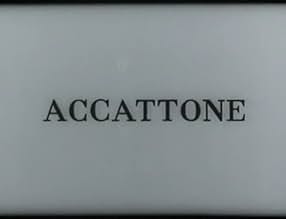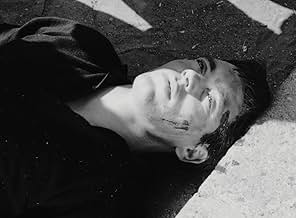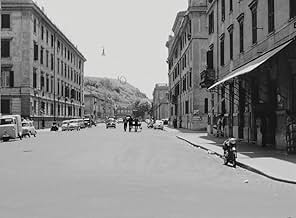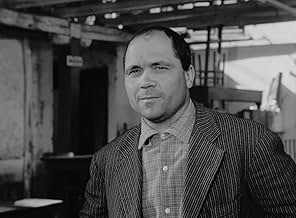AVALIAÇÃO DA IMDb
7,6/10
11 mil
SUA AVALIAÇÃO
Um cafetão sem outros meios para se sustentar vê sua vida sair do controle quando sua prostituta é mandada para a prisão.Um cafetão sem outros meios para se sustentar vê sua vida sair do controle quando sua prostituta é mandada para a prisão.Um cafetão sem outros meios para se sustentar vê sua vida sair do controle quando sua prostituta é mandada para a prisão.
- Direção
- Roteiristas
- Artistas
- Indicado para 1 prêmio BAFTA
- 3 vitórias e 4 indicações no total
Avaliações em destaque
Pasolini's first film "Accatone" is exactly as one would expect a typical Pasolini film to be: wreathed in raw violence, and shot with a brilliant sense of poetic slash brutal realism, reminiscent of the neo-realism era, and perhaps, if not for sure, a semi-autobiographical portrait of life in the streets of Rome's peripheries. "Accatone" is, at its best, a chunk of life, which Pasolini managed to extract not as it initially was, but dramatically filtered through his own personal lyrical gaze. Gangs, prostitutes, lies and deceit lie in this film's core. A sense of irresponsible opportunism is seen in this film, almost no regrets for the past and no fears for the future. In fact, the movie's tragic hero, Vittorio Accatone, is a dark alter-ego of yet another favored Italian movie character, embodied only a year before by Marcello Mastroianni in "La Dolce Vita". Perhaps, in this case, Accatone was not a party animal journalist who sought ephemeral pleasure in social middle-class gatherings and women, but the spirit is, by itself, maintained astonishingly faithfully: Accatone is no longer a protagonist in Pasolini's movie, doomed to descend lower and lower in social class, losing both his dignity, his social acceptability and his profound "style", but a symbol, a metaphor for Pasolini's own political beliefs. Under this figure of a brute, behind the otherwise repelling image of a short dirty man with a sly smile and a peculiar walk, lies the failure of post war Italian government, a government which, according to this movie's subtext, strove so hopelessly to attain social and economical success for Rome's population, and somehow neglected or marginalized Rome's peripheries, causing people like Accatone and his girlfriends to result in prostitution and theft. A kind of pretension and make-belief well being which was also visible, at the time, in America. Yes, Accatone is the result of this American Dream's pastische.
Accattone is a Roman pimp who lives off his girlfriend Maddalena's earnings. Pasolini's cheeky aim is to put forward this young man as a modern saint. To this end he lathers Bach's St Matthew's Passion (inspired by the Apostle's experience of the crucifixion of Christ) over scenes of Accattone's life. Indeed in one of Accattone's first scenes he's shown devouring a slice of tomato, displayed horizontally as if a cardinal's galero, whilst an sculpture of perhaps a guardian angel can be seen over his shoulder in the distance (an anti-clerical pro-Christ stance seems to be a consistent theme for Pasolini). Later, a prophecy regarding Accattone's descent is eerily similar to Christ's pronunciation of Peter's forthcoming triple renunciation.
The film reminded me of a DH Lawrence poem (elliptically titled Democracy):
"I love the sun in any man / when I see it between his brows / clear, and fearless, even if tiny // But when I see these grey successful men / so hideous and corpse-like, utterly sunless, / like gross successful slaves mechanically waddling / then I am more than radical, I want to work a guillotine
...
I feel that when people have gone utterly sunless / they shouldn't exist."
Whatever Accattone is, he's not sunless; when he tries out the world of work (legitimate work involving labour), he becomes Vittorio, his Christian name, and the light goes out. The film reminds me very much of Fassbinder's Gods of the Plague in that sense, young men with brio but no skills or education who, given the choice, between drudgery or crime, choose crime. Both films polemicise against urban post-industrial capitalist societies, which have become increasingly removed from the milieu in which humanity evolved and is "designed" to cope with. When Accattone compares the chore of lifting rolls of iron with the horrors of Buchenwald the film goes a little over the top.
Of course someone viewing Accattone and his friends through less of a haze of desire than the director might think that they were just a bunch of jerks. Undeniably though, Pasolini is a great poet, and there's evidence of things to come here, the film whilst looking largely Bertoluccian (he was the assistant director), has the occasional master shot, for example the rolling hills and valley in the dream sequence, par with Leonardo in quality of composition and symbolism; the countryside here representing an idealised rural precursor to Accattone's slum existence.
I also applaud Pasolini for taking his arguments beyond class, Accattone's group of spongers contains educated men as well as dunces, and they are equally disdainful of the ruling class as they are of proletarians.
The film reminded me of a DH Lawrence poem (elliptically titled Democracy):
"I love the sun in any man / when I see it between his brows / clear, and fearless, even if tiny // But when I see these grey successful men / so hideous and corpse-like, utterly sunless, / like gross successful slaves mechanically waddling / then I am more than radical, I want to work a guillotine
...
I feel that when people have gone utterly sunless / they shouldn't exist."
Whatever Accattone is, he's not sunless; when he tries out the world of work (legitimate work involving labour), he becomes Vittorio, his Christian name, and the light goes out. The film reminds me very much of Fassbinder's Gods of the Plague in that sense, young men with brio but no skills or education who, given the choice, between drudgery or crime, choose crime. Both films polemicise against urban post-industrial capitalist societies, which have become increasingly removed from the milieu in which humanity evolved and is "designed" to cope with. When Accattone compares the chore of lifting rolls of iron with the horrors of Buchenwald the film goes a little over the top.
Of course someone viewing Accattone and his friends through less of a haze of desire than the director might think that they were just a bunch of jerks. Undeniably though, Pasolini is a great poet, and there's evidence of things to come here, the film whilst looking largely Bertoluccian (he was the assistant director), has the occasional master shot, for example the rolling hills and valley in the dream sequence, par with Leonardo in quality of composition and symbolism; the countryside here representing an idealised rural precursor to Accattone's slum existence.
I also applaud Pasolini for taking his arguments beyond class, Accattone's group of spongers contains educated men as well as dunces, and they are equally disdainful of the ruling class as they are of proletarians.
10NYLux
This is still a masterpiece of a film you can not afford not to see if you like Pasolini. "Accattone" is the directorial debut of the Italian neo-realist, Pier Paolo Pasolini, but by a strange coincidence it ended up being the very last of all his movies that I saw. I had seen everything he ever did, including short films by the time I got to "Accatone" and still found it masterful.
Franco Citti stars as the title character, he is a handsome pimp in Rome's post-war lower depths, with an endearing face that speaks volumes of his street-wise upbringing in the slums. To those unaccustomed with Southern Italian culture the way he spends his days with the other local pimps, playing cards and being lazy may seem vile, but it is actually a well grounded tradition, as is also his support of the entire family of his imprisoned friend, Ciccio, who depend on him for survival. He is obviously a fellow mobster, and their code of honor is at stake when Accatone discovers that he is in prison as a result of his whore, Maddalena, played by Silvana Corsini, who denounced Ciccio to the authorities. Even though she is recovering from a broken leg, Accatone forces her to go on the streets, where she is used, beaten and abandoned by Accatone's pals after he tells them the story, then she is found by the police and arrested. Accattone nearly starves to death from the total lack of income, he even sells all his jewelry to get by. He tries to reunite with his wife, with whom he has fathered at least one child, but she sees through his seduction act and her virile, beautiful brother beats up Accatone in an intense erotically-charged scene that seems to simulate sexual assault as much as violence between the men.
After meeting the innocent and beautiful Stella, (Franca Pasut) he is smitten and tries to get a job, so he can support her and his family but he is not accustomed to hardship and has the lack of patience that is typical of spoilt types that have never been trained to work does not make the job last for very long.
Never have I seen a more humane, direct and simple depiction of the tragic life of these undesirables of society. Pasolini is a master painter narrating with a few gestures all their hardship and suffering. Even getting a plate of food in this world is a memorable accomplishment. We see the whole setting as a sideline of modern society's inability to function properly. The 'corrections' by the police seem to be the most unjust of all, and Pasolini presents this panorama of human failing as an allegory of human struggle and spiritual redemption.
Franco Citti stars as the title character, he is a handsome pimp in Rome's post-war lower depths, with an endearing face that speaks volumes of his street-wise upbringing in the slums. To those unaccustomed with Southern Italian culture the way he spends his days with the other local pimps, playing cards and being lazy may seem vile, but it is actually a well grounded tradition, as is also his support of the entire family of his imprisoned friend, Ciccio, who depend on him for survival. He is obviously a fellow mobster, and their code of honor is at stake when Accatone discovers that he is in prison as a result of his whore, Maddalena, played by Silvana Corsini, who denounced Ciccio to the authorities. Even though she is recovering from a broken leg, Accatone forces her to go on the streets, where she is used, beaten and abandoned by Accatone's pals after he tells them the story, then she is found by the police and arrested. Accattone nearly starves to death from the total lack of income, he even sells all his jewelry to get by. He tries to reunite with his wife, with whom he has fathered at least one child, but she sees through his seduction act and her virile, beautiful brother beats up Accatone in an intense erotically-charged scene that seems to simulate sexual assault as much as violence between the men.
After meeting the innocent and beautiful Stella, (Franca Pasut) he is smitten and tries to get a job, so he can support her and his family but he is not accustomed to hardship and has the lack of patience that is typical of spoilt types that have never been trained to work does not make the job last for very long.
Never have I seen a more humane, direct and simple depiction of the tragic life of these undesirables of society. Pasolini is a master painter narrating with a few gestures all their hardship and suffering. Even getting a plate of food in this world is a memorable accomplishment. We see the whole setting as a sideline of modern society's inability to function properly. The 'corrections' by the police seem to be the most unjust of all, and Pasolini presents this panorama of human failing as an allegory of human struggle and spiritual redemption.
In the poor periphery of Rome of the 60's, the despicable caftan Vittorio "Accattone" Cataldi (Franco Citti) is maintained by the hooker Maddalena (Silvana Corsini), spending the time with his useless idle friends. When the prostitute is arrested for perjury, the pimp "Accattone" has nobody to support him, but he seduces the naive worker Stella (Franca Pasut) and she becomes a whore. However, Accattone has a crush on Stella and decides to find a way to support her, with tragic consequences.
"Accattone" is the stunning debut of the great director Pier Paolo Pasolini. He returns to the theme of the misery of Italy in the postwar, explored in many Italian neo-realist movies such as Fellini's "Le Notti di Cabiria" (1957) and Visconti's "Rocco e i Suoi Fratelli" (1960), and magnificently shows the lifestyle of great part of the population in Italy, its lower class, with lack of perspective, starvation, prostitution and unemployment. Considering that this movie is also the debut or the beginning of the career of most actors and actresses, it is amazing how Pasolini was able to make such gem. My vote is nine.
Title (Brazil): "Accattoni Desajuste Social" ("Accattoni Social Maladjustment")
"Accattone" is the stunning debut of the great director Pier Paolo Pasolini. He returns to the theme of the misery of Italy in the postwar, explored in many Italian neo-realist movies such as Fellini's "Le Notti di Cabiria" (1957) and Visconti's "Rocco e i Suoi Fratelli" (1960), and magnificently shows the lifestyle of great part of the population in Italy, its lower class, with lack of perspective, starvation, prostitution and unemployment. Considering that this movie is also the debut or the beginning of the career of most actors and actresses, it is amazing how Pasolini was able to make such gem. My vote is nine.
Title (Brazil): "Accattoni Desajuste Social" ("Accattoni Social Maladjustment")
Yes, it has some not so good scenes, bad lightning and it´s far from Passolini's beautiful aesthetic, but still, this movie is a masterpiece for what it represents. A brilliant start for a genius career, powerful and great story, and Pasolini's essence all over.
Você sabia?
- CuriosidadesThis was Bernardo Bertolucci's first work in movies. He was an assistant director.
- Erros de gravaçãoThe shadow of the camera is clearly visible on Accattone's shirt when he walks away towards the camera after the fight with Ascenza's Brother.
- Citações
Vittorio "Accattone" Cataldi: Call me Accattone. There are lots of Vittorios but I'm the only Accattone.
- Versões alternativasThe VHS and DVD versions produced by Water Bearer Films are listed as running 116 minutes, suggesting that this print is four minutes shorter than the original release.
- Trilhas sonorasSt Matthew Passion
Composed by Johann Sebastian Bach
Principais escolhas
Faça login para avaliar e ver a lista de recomendações personalizadas
- How long is Accattone?Fornecido pela Alexa
Detalhes
Bilheteria
- Faturamento bruto mundial
- US$ 2.865
- Tempo de duração
- 1 h 57 min(117 min)
- Cor
- Mixagem de som
- Proporção
- 1.37 : 1
Contribua para esta página
Sugerir uma alteração ou adicionar conteúdo ausente
































